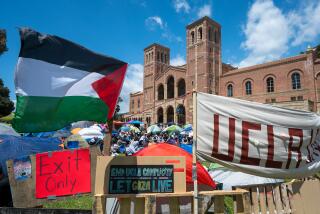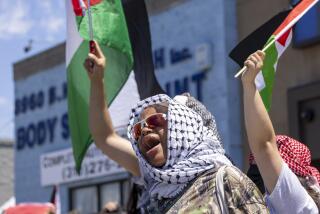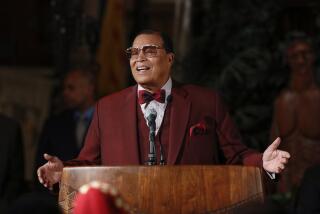Accord Found on Wiesenthal Center Status
- Share via
The Simon Wiesenthal Center’s planned Museum of Tolerance in West Los Angeles will operate independently of Yeshiva University and “in a non-sectarian manner” under terms of a settlement to a lawsuit announced Wednesday by the American Civil Liberties Union and the private group.
The suit, filed last October in Los Angeles Superior Court by the ACLU on behalf of David J. Cohen, a certified public accountant, and his wife, Rosetta, contended that a state grant of $5 million for construction costs would violate the California Constitution’s mandate separating church and state.
Hammered out after about three months of negotiations, the agreement came amid sharp division in the Jewish community over the issue of a state subsidy for a museum closely tied to a religious school.
The Wiesenthal Center, named after the renowned Nazi hunter, is affiliated with Yeshiva University of Los Angeles, an Orthodox Jewish institution currently sharing the center complex. Construction of a separate museum next to the school, at an estimated cost of $20 million, is expected to begin later this year.
Under the agreement, Wiesenthal officials will be allowed to use the $5 million for construction of the new museum, which until last March was a division of Yeshiva.
“We have, in effect, built a wall between the (Wiesenthal) center and Yeshiva University,” Jerome B. Falk Jr., an attorney representing the center, told a news conference at the Greater Los Angeles Press Club. “It’s a case where every one wins.”
In clearing the way for use of the grant, contained in legislation signed into law by Gov. George Deukmejian last July, Fred M. Blum, an ACLU attorney, told reporters the settlement assures “that the separation of church and state has been protected.”
The American Jewish Committee and four California chapters of the Anti-Defamation League of the B’nai B’rith were among groups that opposed the funding measure on grounds that it was a state subsidy for a religious institution.
Under terms of the 12-page settlement:
- The Wiesenthal Center “shall make no loans, grants or other uncompensated transfers of its funds to (Yeshiva) or for scholarships to students attending (Yeshiva).”
(Plaintiff Cohen told the news conference that his study of the books of the two institutions showed that “hundreds of thousands of dollars raised on behalf of the Wiesenthal Center went to Yeshiva.”)
- No more than 40% of the Wiesenthal Center’s board of trustees and the board’s executive committee can also be members of Yeshiva’s board.
(Under the pact’s terms, Rabbi Marvin Hier will continue to serve as dean of the center and of Yeshiva. William Belzberg, a Beverly Hills financier and major contributor to the center, will continue to serve as a member of the board of trustees of both institutions, Falk said.)
- The new building must be operated “in a non-sectarian manner,” and its seminar rooms can’t be used for Yeshiva classes.
- “The new building will not be decorated with religious symbols.”
- Title to the land on which the new museum will be located will be transferred by Yeshiva to the center, which already has reimbursed Yeshiva for its cost.
The Wiesenthal Center, which its officials said had outgrown its 3,100 square feet, is a repository of documents and photographs dramatically spotlighting the Nazi slaughter in Europe of millions of Jews and other minority members during World War II. The new 30,000-square-foot, four-story museum, to be built next door on Pico Boulevard, will have an auditorium, seminar rooms and theaters for screening the center’s film archives.
But the new center, according to its officials, also will go beyond the mass murders of World War II and will include a special section of memorabilia distilled from the slaying of thousands of Armenians in Turkey during World War I.
More to Read
Sign up for Essential California
The most important California stories and recommendations in your inbox every morning.
You may occasionally receive promotional content from the Los Angeles Times.










